Corporate Social Responsibility: Financial Accounting Essay
VerifiedAdded on 2022/10/10
|6
|1315
|484
Essay
AI Summary
This essay provides a comprehensive overview of Corporate Social Responsibility (CSR) from a financial accounting perspective. It begins with an introduction to CSR as a self-regulating business model, emphasizing its importance for companies to remain socially accountable and contribute to society. The essay then traces the historical evolution of CSR, highlighting the growing attention businesses must pay to societal welfare and employee well-being. It explores common CSR theories, including stakeholder theory, resource dependency theory, and ethical theories, along with their practical applications. The discussion covers CSR trends, practices, and limitations, such as the shift in business objectives, potential increases in production costs, and the impact on shareholder profits. The essay concludes by summarizing the key aspects of CSR and its multifaceted approaches, including legal, ethical, and economic dimensions, and their relevance to business ethics and discretionary terms.
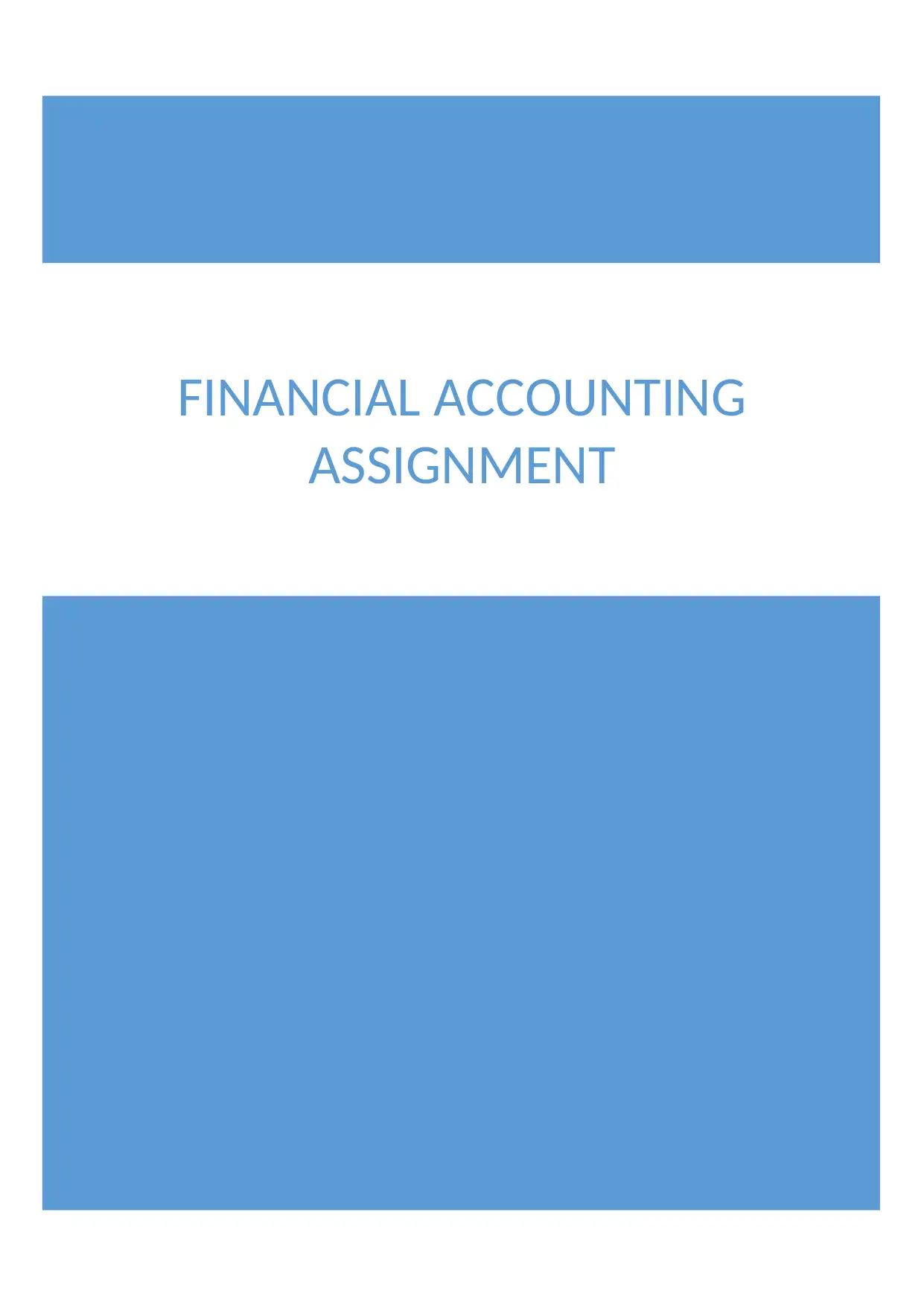
FINANCIAL ACCOUNTING
ASSIGNMENT
ASSIGNMENT
Paraphrase This Document
Need a fresh take? Get an instant paraphrase of this document with our AI Paraphraser
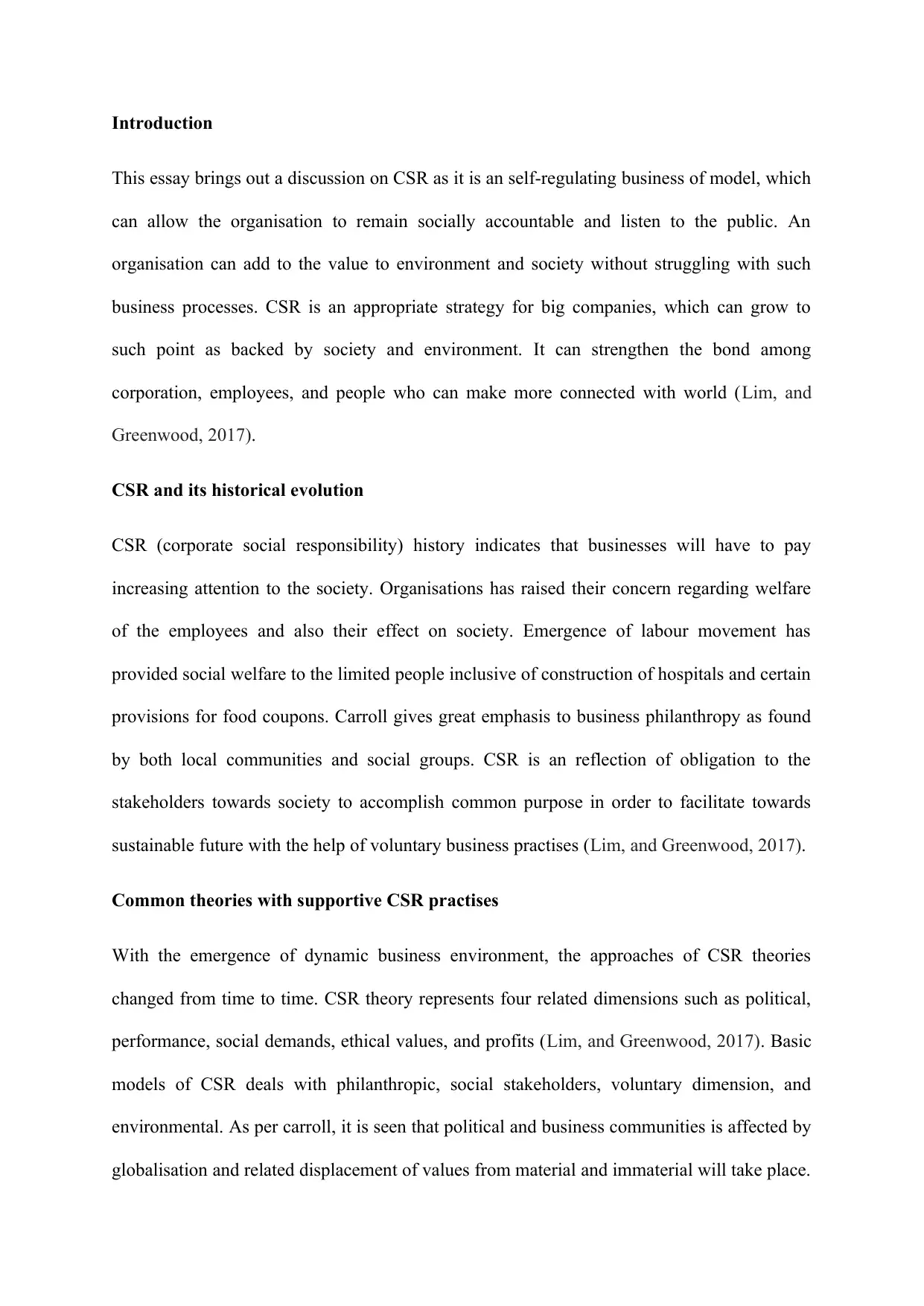
Introduction
This essay brings out a discussion on CSR as it is an self-regulating business of model, which
can allow the organisation to remain socially accountable and listen to the public. An
organisation can add to the value to environment and society without struggling with such
business processes. CSR is an appropriate strategy for big companies, which can grow to
such point as backed by society and environment. It can strengthen the bond among
corporation, employees, and people who can make more connected with world (Lim, and
Greenwood, 2017).
CSR and its historical evolution
CSR (corporate social responsibility) history indicates that businesses will have to pay
increasing attention to the society. Organisations has raised their concern regarding welfare
of the employees and also their effect on society. Emergence of labour movement has
provided social welfare to the limited people inclusive of construction of hospitals and certain
provisions for food coupons. Carroll gives great emphasis to business philanthropy as found
by both local communities and social groups. CSR is an reflection of obligation to the
stakeholders towards society to accomplish common purpose in order to facilitate towards
sustainable future with the help of voluntary business practises (Lim, and Greenwood, 2017).
Common theories with supportive CSR practises
With the emergence of dynamic business environment, the approaches of CSR theories
changed from time to time. CSR theory represents four related dimensions such as political,
performance, social demands, ethical values, and profits (Lim, and Greenwood, 2017). Basic
models of CSR deals with philanthropic, social stakeholders, voluntary dimension, and
environmental. As per carroll, it is seen that political and business communities is affected by
globalisation and related displacement of values from material and immaterial will take place.
This essay brings out a discussion on CSR as it is an self-regulating business of model, which
can allow the organisation to remain socially accountable and listen to the public. An
organisation can add to the value to environment and society without struggling with such
business processes. CSR is an appropriate strategy for big companies, which can grow to
such point as backed by society and environment. It can strengthen the bond among
corporation, employees, and people who can make more connected with world (Lim, and
Greenwood, 2017).
CSR and its historical evolution
CSR (corporate social responsibility) history indicates that businesses will have to pay
increasing attention to the society. Organisations has raised their concern regarding welfare
of the employees and also their effect on society. Emergence of labour movement has
provided social welfare to the limited people inclusive of construction of hospitals and certain
provisions for food coupons. Carroll gives great emphasis to business philanthropy as found
by both local communities and social groups. CSR is an reflection of obligation to the
stakeholders towards society to accomplish common purpose in order to facilitate towards
sustainable future with the help of voluntary business practises (Lim, and Greenwood, 2017).
Common theories with supportive CSR practises
With the emergence of dynamic business environment, the approaches of CSR theories
changed from time to time. CSR theory represents four related dimensions such as political,
performance, social demands, ethical values, and profits (Lim, and Greenwood, 2017). Basic
models of CSR deals with philanthropic, social stakeholders, voluntary dimension, and
environmental. As per carroll, it is seen that political and business communities is affected by
globalisation and related displacement of values from material and immaterial will take place.
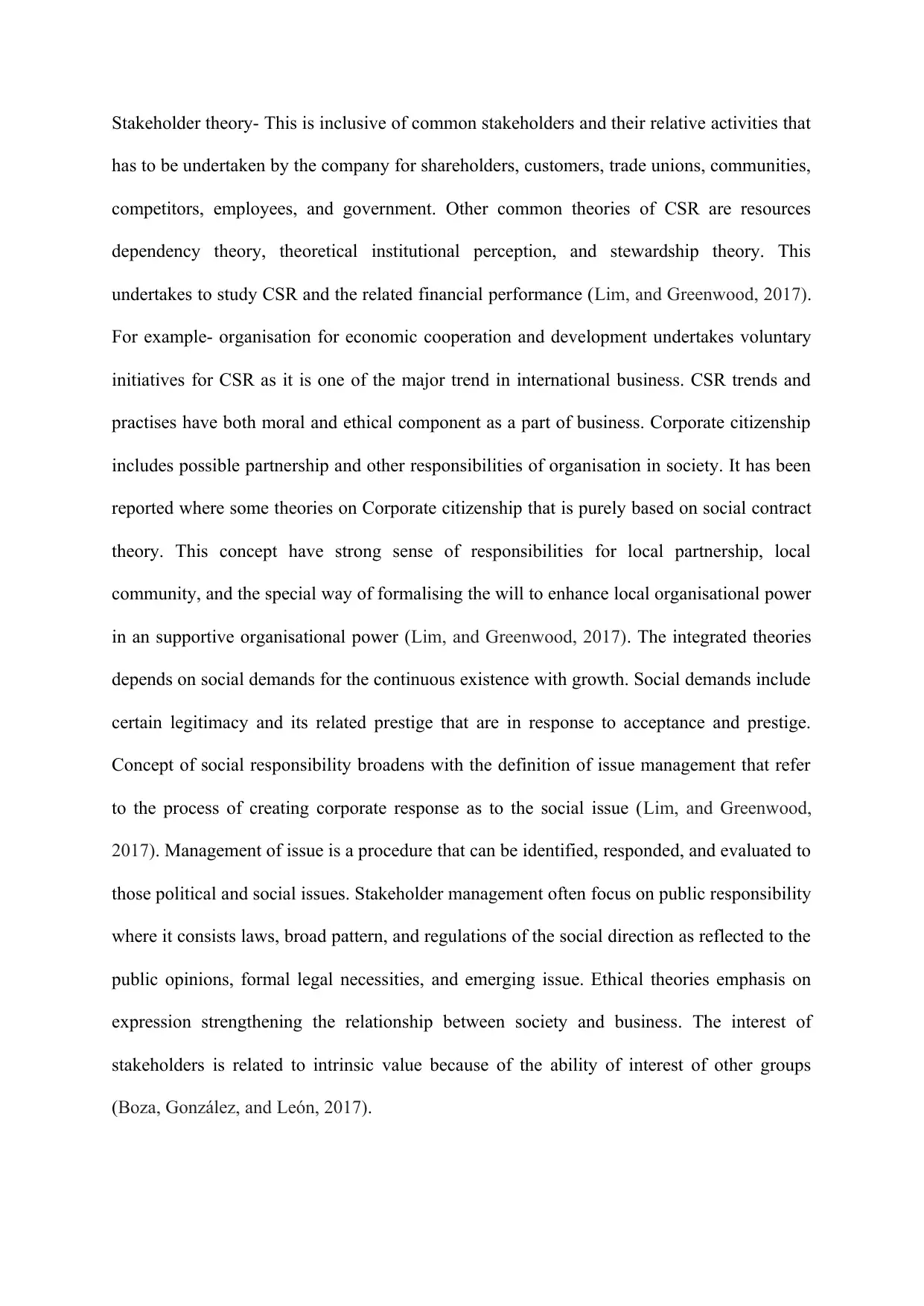
Stakeholder theory- This is inclusive of common stakeholders and their relative activities that
has to be undertaken by the company for shareholders, customers, trade unions, communities,
competitors, employees, and government. Other common theories of CSR are resources
dependency theory, theoretical institutional perception, and stewardship theory. This
undertakes to study CSR and the related financial performance (Lim, and Greenwood, 2017).
For example- organisation for economic cooperation and development undertakes voluntary
initiatives for CSR as it is one of the major trend in international business. CSR trends and
practises have both moral and ethical component as a part of business. Corporate citizenship
includes possible partnership and other responsibilities of organisation in society. It has been
reported where some theories on Corporate citizenship that is purely based on social contract
theory. This concept have strong sense of responsibilities for local partnership, local
community, and the special way of formalising the will to enhance local organisational power
in an supportive organisational power (Lim, and Greenwood, 2017). The integrated theories
depends on social demands for the continuous existence with growth. Social demands include
certain legitimacy and its related prestige that are in response to acceptance and prestige.
Concept of social responsibility broadens with the definition of issue management that refer
to the process of creating corporate response as to the social issue (Lim, and Greenwood,
2017). Management of issue is a procedure that can be identified, responded, and evaluated to
those political and social issues. Stakeholder management often focus on public responsibility
where it consists laws, broad pattern, and regulations of the social direction as reflected to the
public opinions, formal legal necessities, and emerging issue. Ethical theories emphasis on
expression strengthening the relationship between society and business. The interest of
stakeholders is related to intrinsic value because of the ability of interest of other groups
(Boza, González, and León, 2017).
has to be undertaken by the company for shareholders, customers, trade unions, communities,
competitors, employees, and government. Other common theories of CSR are resources
dependency theory, theoretical institutional perception, and stewardship theory. This
undertakes to study CSR and the related financial performance (Lim, and Greenwood, 2017).
For example- organisation for economic cooperation and development undertakes voluntary
initiatives for CSR as it is one of the major trend in international business. CSR trends and
practises have both moral and ethical component as a part of business. Corporate citizenship
includes possible partnership and other responsibilities of organisation in society. It has been
reported where some theories on Corporate citizenship that is purely based on social contract
theory. This concept have strong sense of responsibilities for local partnership, local
community, and the special way of formalising the will to enhance local organisational power
in an supportive organisational power (Lim, and Greenwood, 2017). The integrated theories
depends on social demands for the continuous existence with growth. Social demands include
certain legitimacy and its related prestige that are in response to acceptance and prestige.
Concept of social responsibility broadens with the definition of issue management that refer
to the process of creating corporate response as to the social issue (Lim, and Greenwood,
2017). Management of issue is a procedure that can be identified, responded, and evaluated to
those political and social issues. Stakeholder management often focus on public responsibility
where it consists laws, broad pattern, and regulations of the social direction as reflected to the
public opinions, formal legal necessities, and emerging issue. Ethical theories emphasis on
expression strengthening the relationship between society and business. The interest of
stakeholders is related to intrinsic value because of the ability of interest of other groups
(Boza, González, and León, 2017).
⊘ This is a preview!⊘
Do you want full access?
Subscribe today to unlock all pages.

Trusted by 1+ million students worldwide
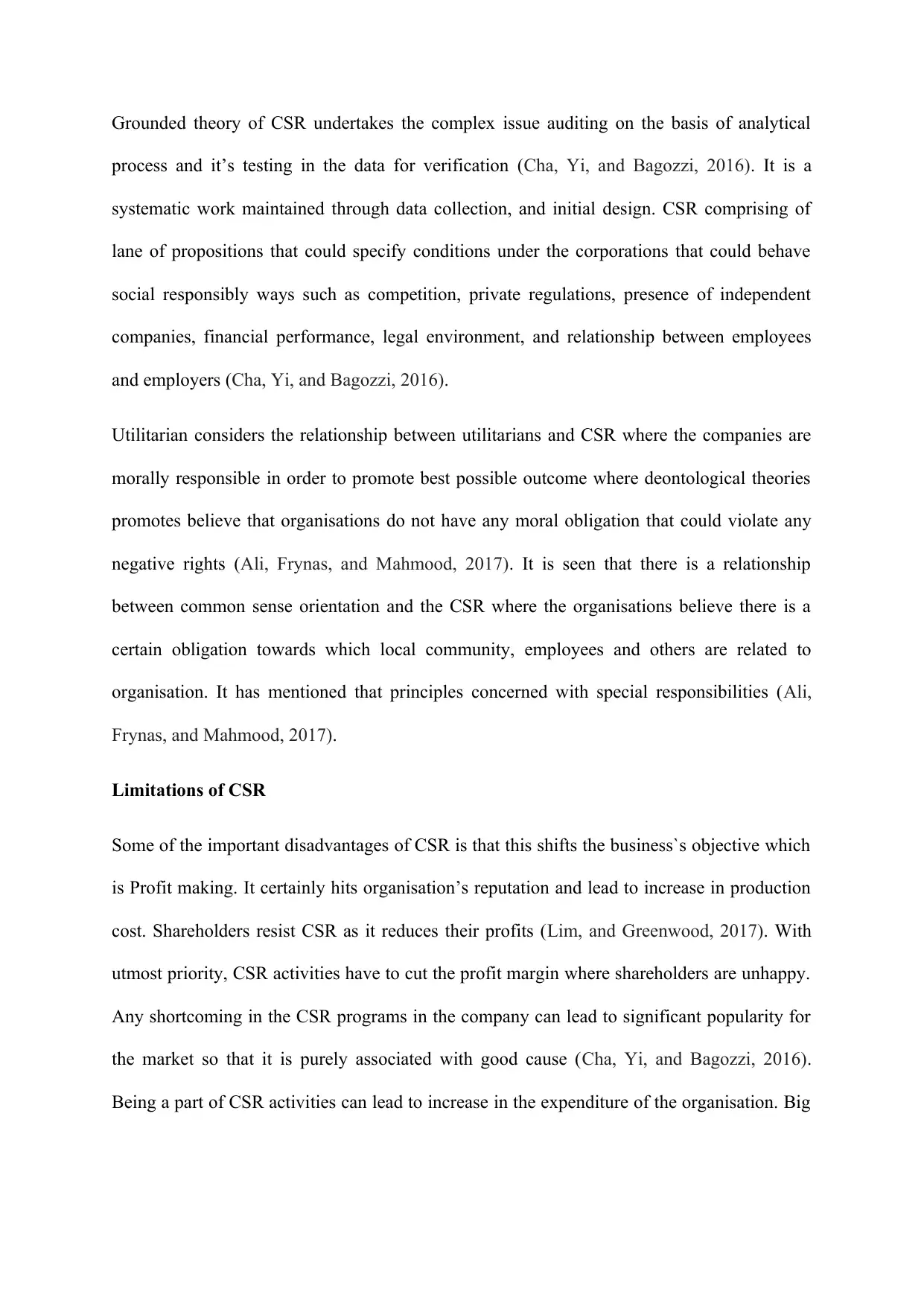
Grounded theory of CSR undertakes the complex issue auditing on the basis of analytical
process and it’s testing in the data for verification (Cha, Yi, and Bagozzi, 2016). It is a
systematic work maintained through data collection, and initial design. CSR comprising of
lane of propositions that could specify conditions under the corporations that could behave
social responsibly ways such as competition, private regulations, presence of independent
companies, financial performance, legal environment, and relationship between employees
and employers (Cha, Yi, and Bagozzi, 2016).
Utilitarian considers the relationship between utilitarians and CSR where the companies are
morally responsible in order to promote best possible outcome where deontological theories
promotes believe that organisations do not have any moral obligation that could violate any
negative rights (Ali, Frynas, and Mahmood, 2017). It is seen that there is a relationship
between common sense orientation and the CSR where the organisations believe there is a
certain obligation towards which local community, employees and others are related to
organisation. It has mentioned that principles concerned with special responsibilities (Ali,
Frynas, and Mahmood, 2017).
Limitations of CSR
Some of the important disadvantages of CSR is that this shifts the business`s objective which
is Profit making. It certainly hits organisation’s reputation and lead to increase in production
cost. Shareholders resist CSR as it reduces their profits (Lim, and Greenwood, 2017). With
utmost priority, CSR activities have to cut the profit margin where shareholders are unhappy.
Any shortcoming in the CSR programs in the company can lead to significant popularity for
the market so that it is purely associated with good cause (Cha, Yi, and Bagozzi, 2016).
Being a part of CSR activities can lead to increase in the expenditure of the organisation. Big
process and it’s testing in the data for verification (Cha, Yi, and Bagozzi, 2016). It is a
systematic work maintained through data collection, and initial design. CSR comprising of
lane of propositions that could specify conditions under the corporations that could behave
social responsibly ways such as competition, private regulations, presence of independent
companies, financial performance, legal environment, and relationship between employees
and employers (Cha, Yi, and Bagozzi, 2016).
Utilitarian considers the relationship between utilitarians and CSR where the companies are
morally responsible in order to promote best possible outcome where deontological theories
promotes believe that organisations do not have any moral obligation that could violate any
negative rights (Ali, Frynas, and Mahmood, 2017). It is seen that there is a relationship
between common sense orientation and the CSR where the organisations believe there is a
certain obligation towards which local community, employees and others are related to
organisation. It has mentioned that principles concerned with special responsibilities (Ali,
Frynas, and Mahmood, 2017).
Limitations of CSR
Some of the important disadvantages of CSR is that this shifts the business`s objective which
is Profit making. It certainly hits organisation’s reputation and lead to increase in production
cost. Shareholders resist CSR as it reduces their profits (Lim, and Greenwood, 2017). With
utmost priority, CSR activities have to cut the profit margin where shareholders are unhappy.
Any shortcoming in the CSR programs in the company can lead to significant popularity for
the market so that it is purely associated with good cause (Cha, Yi, and Bagozzi, 2016).
Being a part of CSR activities can lead to increase in the expenditure of the organisation. Big
Paraphrase This Document
Need a fresh take? Get an instant paraphrase of this document with our AI Paraphraser
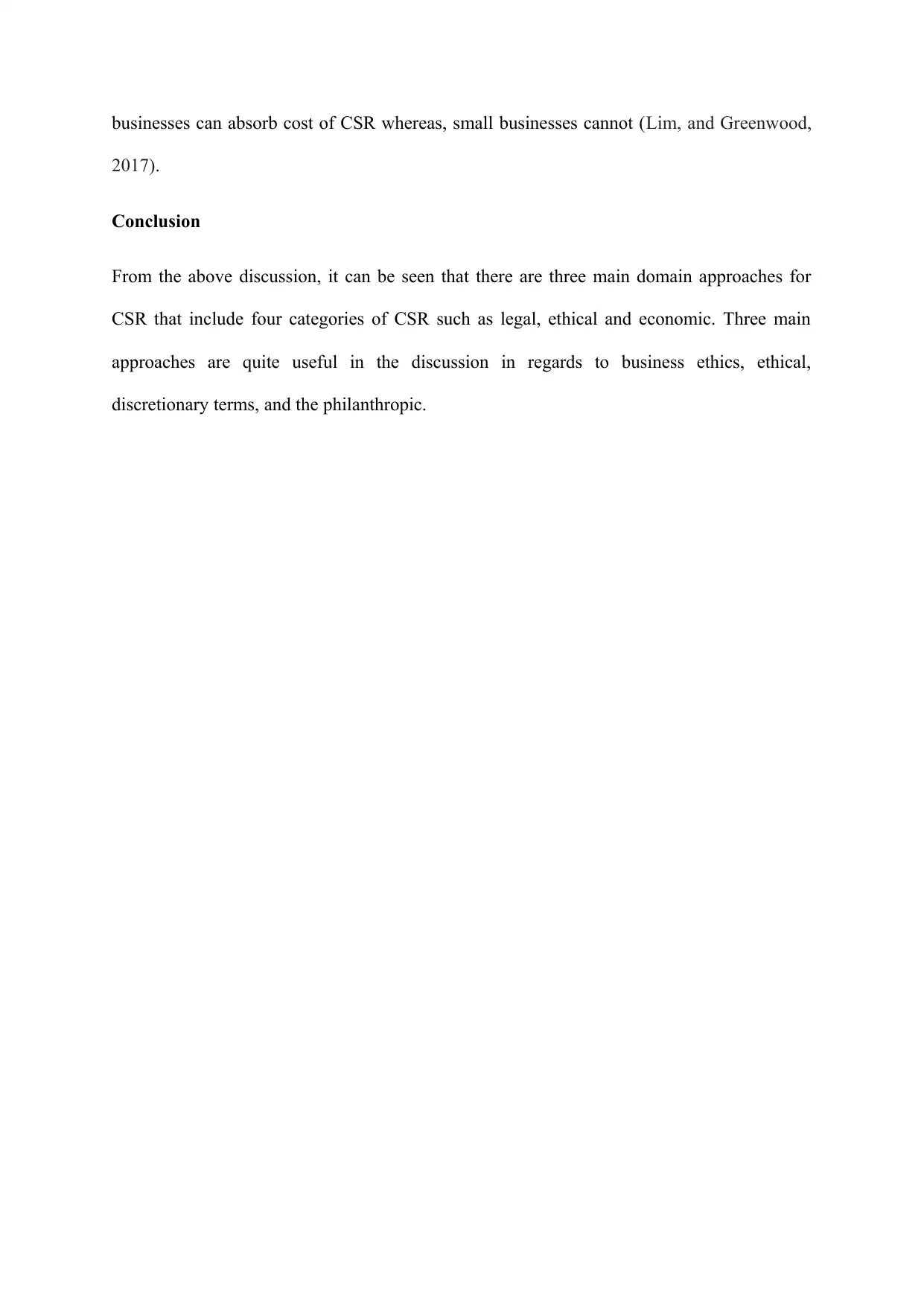
businesses can absorb cost of CSR whereas, small businesses cannot (Lim, and Greenwood,
2017).
Conclusion
From the above discussion, it can be seen that there are three main domain approaches for
CSR that include four categories of CSR such as legal, ethical and economic. Three main
approaches are quite useful in the discussion in regards to business ethics, ethical,
discretionary terms, and the philanthropic.
2017).
Conclusion
From the above discussion, it can be seen that there are three main domain approaches for
CSR that include four categories of CSR such as legal, ethical and economic. Three main
approaches are quite useful in the discussion in regards to business ethics, ethical,
discretionary terms, and the philanthropic.
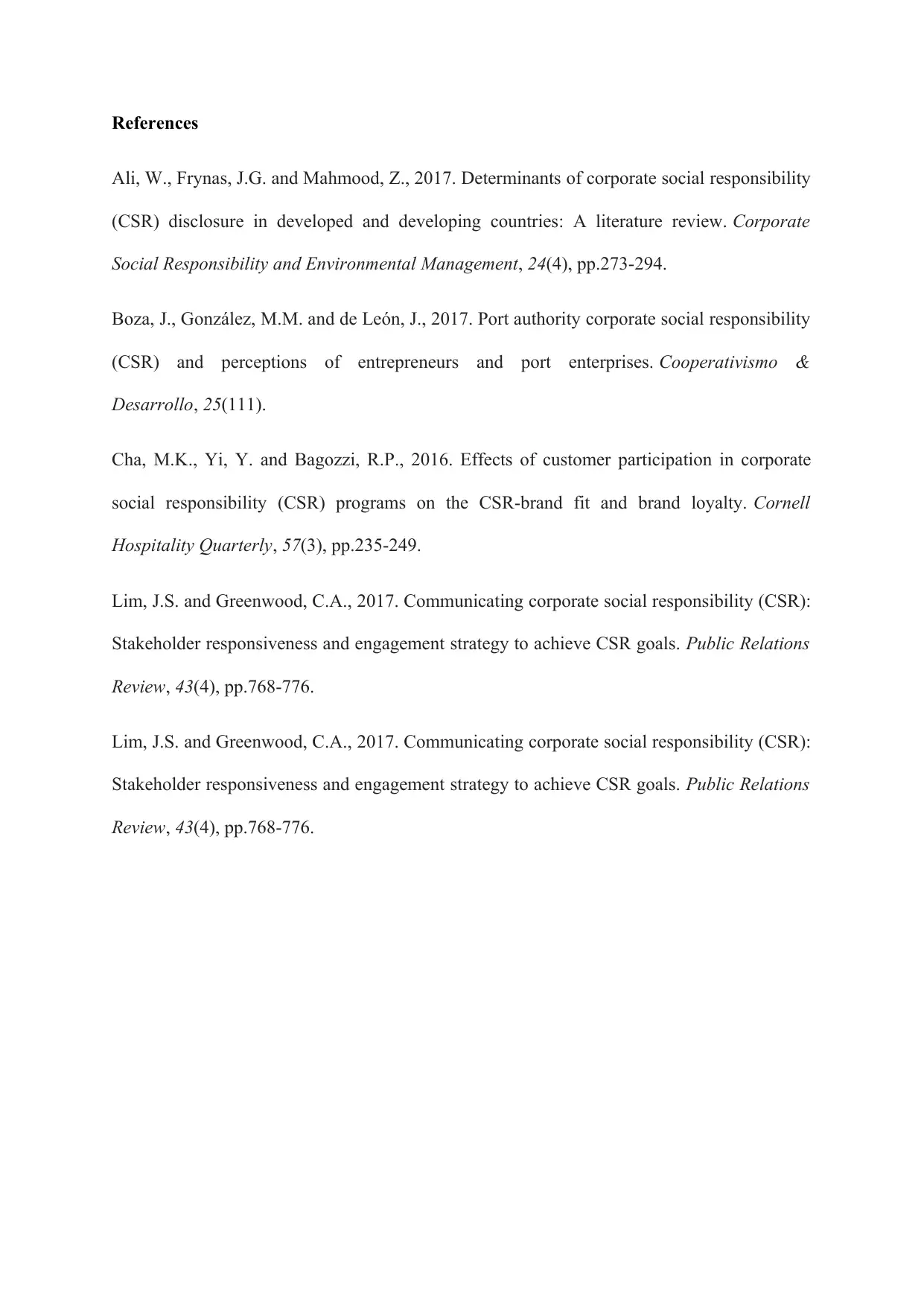
References
Ali, W., Frynas, J.G. and Mahmood, Z., 2017. Determinants of corporate social responsibility
(CSR) disclosure in developed and developing countries: A literature review. Corporate
Social Responsibility and Environmental Management, 24(4), pp.273-294.
Boza, J., González, M.M. and de León, J., 2017. Port authority corporate social responsibility
(CSR) and perceptions of entrepreneurs and port enterprises. Cooperativismo &
Desarrollo, 25(111).
Cha, M.K., Yi, Y. and Bagozzi, R.P., 2016. Effects of customer participation in corporate
social responsibility (CSR) programs on the CSR-brand fit and brand loyalty. Cornell
Hospitality Quarterly, 57(3), pp.235-249.
Lim, J.S. and Greenwood, C.A., 2017. Communicating corporate social responsibility (CSR):
Stakeholder responsiveness and engagement strategy to achieve CSR goals. Public Relations
Review, 43(4), pp.768-776.
Lim, J.S. and Greenwood, C.A., 2017. Communicating corporate social responsibility (CSR):
Stakeholder responsiveness and engagement strategy to achieve CSR goals. Public Relations
Review, 43(4), pp.768-776.
Ali, W., Frynas, J.G. and Mahmood, Z., 2017. Determinants of corporate social responsibility
(CSR) disclosure in developed and developing countries: A literature review. Corporate
Social Responsibility and Environmental Management, 24(4), pp.273-294.
Boza, J., González, M.M. and de León, J., 2017. Port authority corporate social responsibility
(CSR) and perceptions of entrepreneurs and port enterprises. Cooperativismo &
Desarrollo, 25(111).
Cha, M.K., Yi, Y. and Bagozzi, R.P., 2016. Effects of customer participation in corporate
social responsibility (CSR) programs on the CSR-brand fit and brand loyalty. Cornell
Hospitality Quarterly, 57(3), pp.235-249.
Lim, J.S. and Greenwood, C.A., 2017. Communicating corporate social responsibility (CSR):
Stakeholder responsiveness and engagement strategy to achieve CSR goals. Public Relations
Review, 43(4), pp.768-776.
Lim, J.S. and Greenwood, C.A., 2017. Communicating corporate social responsibility (CSR):
Stakeholder responsiveness and engagement strategy to achieve CSR goals. Public Relations
Review, 43(4), pp.768-776.
⊘ This is a preview!⊘
Do you want full access?
Subscribe today to unlock all pages.

Trusted by 1+ million students worldwide
1 out of 6
Related Documents
Your All-in-One AI-Powered Toolkit for Academic Success.
+13062052269
info@desklib.com
Available 24*7 on WhatsApp / Email
![[object Object]](/_next/static/media/star-bottom.7253800d.svg)
Unlock your academic potential
Copyright © 2020–2026 A2Z Services. All Rights Reserved. Developed and managed by ZUCOL.





